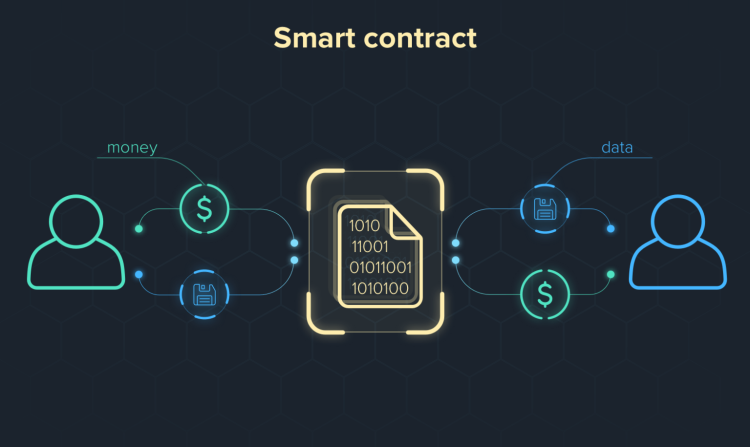Introduction
The term “smart contract” has become a buzzword in the blockchain world, especially with the rise of platforms like Ethereum, Solana, and Cardano. While they might sound futuristic or complex, smart contracts are fundamentally just pieces of code that run on the blockchain. Their importance lies in their ability to automate processes, reduce reliance on intermediaries, and enforce agreements transparently.
But what exactly is a smart contract, and how does it function within a blockchain ecosystem? This article will explore the concept of smart contracts, how they work, and why they are a foundational element of the next generation of decentralized applications (dApps) and blockchain-based systems.
What Is a Smart Contract?
A smart contract is a self-executing program with the terms of the agreement directly written into code. It automatically performs certain actions when predefined conditions are met, without the need for a trusted third party or human intervention.
The term was first coined by cryptographer Nick Szabo in the 1990s, long before blockchain technology existed. He envisioned programmable contracts that could automatically enforce rules and agreements. Blockchain made that vision a practical reality.
Key Characteristics of Smart Contracts
- Autonomous
Once deployed to the blockchain, smart contracts run automatically and independently of their creators. - Immutable
The code of a deployed smart contract cannot be changed. This ensures that once rules are set, they can’t be tampered with. - Transparent
Smart contract code is visible on the blockchain, allowing anyone to inspect how the contract will behave before interacting with it. - Deterministic
Given the same input and conditions, a smart contract will always produce the same output.
How Do Smart Contracts Work?
Smart contracts are typically deployed on programmable blockchains, like:
- Ethereum (using Solidity)
- Solana (using Rust)
- Cardano (using Plutus)
- Polkadot (using Ink!)
Basic Workflow of a Smart Contract:
- Coding
A developer writes the contract code that defines conditions (if/then logic) and actions. - Deployment
The code is deployed to the blockchain, where it gets an address and becomes immutable. - Interaction
Users interact with the contract by sending transactions to its address. These transactions may trigger specific contract functions. - Execution
When triggered, the smart contract evaluates its conditions. If they are met, it automatically executes the corresponding actions.
Real-World Examples of Smart Contracts in Action
1. Decentralized Finance (DeFi)
Smart contracts are at the heart of DeFi platforms, automating lending, borrowing, trading, and yield farming.
- Example: On Compound, users can lend assets and earn interest, all managed by smart contracts without a bank.
2. NFTs (Non-Fungible Tokens)
Minting, transferring, and verifying ownership of NFTs is done through smart contracts.
- Example: An NFT smart contract defines the metadata and ownership of a digital artwork.
3. Decentralized Exchanges (DEXs)
DEXs like Uniswap use smart contracts to facilitate token swaps directly between users without intermediaries.
4. Insurance
Smart contracts can trigger payouts based on real-world data (e.g., flight delays, weather conditions).
- Example: A weather insurance smart contract could automatically pay a farmer if rainfall falls below a certain level.
5. Supply Chain Management
Smart contracts can automate and verify the flow of goods, payments, and certifications across parties.
The Role of Smart Contracts in Blockchain Ecosystems
1. Automation of Agreements
Smart contracts remove the need for manual execution of agreements. This reduces time, cost, and errors.
2. Trustless Transactions
Parties don’t need to trust each other—or a central authority—because the contract enforces the rules automatically and transparently.
3. Decentralized Applications (dApps)
Smart contracts are the backend logic for dApps, which are open-source, user-governed apps that run on the blockchain.
- Examples: Wallets, games, marketplaces, prediction markets
4. Governance and Voting
Smart contracts manage voting in decentralized autonomous organizations (DAOs), ensuring fair and transparent decisions.
5. Tokenization and Digital Assets
Tokens on platforms like Ethereum are created and managed via smart contracts using standards like ERC-20 (fungible tokens) and ERC-721 (non-fungible tokens).

Benefits of Smart Contracts
- Speed: Instant execution when conditions are met
- Cost Efficiency: No need for intermediaries or legal enforcers
- Accuracy: Automated processing reduces human error
- Security: Enforced by blockchain cryptography and consensus
- Global Accessibility: Anyone with internet access can use them
Limitations and Challenges
While powerful, smart contracts are not without limitations:
- Bugs and Vulnerabilities: Errors in the code can be exploited (e.g., The DAO hack in 2016).
- Immutability: Once deployed, contracts can’t be edited—even to fix mistakes—unless special mechanisms are built in.
- Scalability: Executing contracts requires computation, which can congest networks and increase fees.
- External Data (Oracles): Smart contracts can’t access data outside the blockchain natively. They rely on oracles to feed them external information.
Future Outlook of Smart Contracts
As blockchain technology matures, smart contracts are expected to become more:
- User-Friendly: With better interfaces and no-code platforms
- Interoperable: Executable across multiple chains
- Regulated: Recognized in legal systems as enforceable agreements
- Intelligent: Integrated with AI and advanced logic
New technologies like Layer 2 solutions, zero-knowledge proofs, and formal verification are being developed to improve the performance, privacy, and security of smart contracts.
Conclusion
Smart contracts are a cornerstone of blockchain innovation. By automating agreements and eliminating the need for intermediaries, they enable decentralized applications, transparent systems, and new business models across finance, real estate, insurance, supply chains, and beyond.
Their role is not just technical but transformative—reshaping how people, organizations, and machines interact in a trustless digital world. As adoption continues to grow, understanding smart contracts is essential for anyone looking to participate in the decentralized future.













































